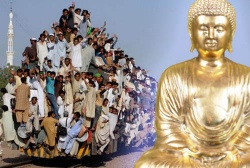Buddhism and Giving
Dana
Dana is an ancient Sanskrit word that is commonly translated into English as "generosity."
It is more than simply generosity though.
It refers not only to giving our time, money and resources but "also about having a liberality of spirit that doesn't erect barriers between self and others."
I'm quoting here from one of my favorite mainstream books (shown to the left) on Buddhism.
Dana is akin to the Christian notion of charity--simply doing something for another because it is the best thing for everyone involved.
It is a living of the Golden Rule.
As the book explains, "Being generous according to the Buddhist concept of dana calls for the same kind of dynamic shift in consciousness [as charity and the Golden Rule).
It means breaking through the self-oriented attitude that we're making a sacrifice or that we're martyring ourselves when we put the needs of others ahead of our own self-interest.
We learn to welcome occasions for generosity as golden opportunities to express [and] realize the wealth and abundance of our innate goodness."
I believe the more we try to look beyond ourselves when giving, the more opportunities we see to give and the happier we are doing it.
Buddha said, "Generosity brings happiness at every stage: in framing the intention, in the act of giving, and in rejoicing afterward."
Going Down the Path
Buddha is as Buddha Does suggests that increased generosity can begin right away simply by being more compassionate and giving to others in our thoughts, words and deeds.
I like this because (1) we all likely have room to improve on these fronts; and (2) it doesn't costs anything to think and speak compassionately toward someone or to do a good deed.
This doesn't mean it's easy though. Sometimes when I read books by the Dalai Lama or on Buddhism I think, "Well, yeah, I agree with all of this but putting it into practice in the real world is sometimes pretty tough."
For example, sometimes a compassionate thought about someone is much more difficult than making a donation to a charity.
Why is that? This difficulty is why I think it is important to keep these teachings in mind and why Buddhism is a "practice."
Three Kinds of Generosity
Tibetan Buddhists believe there are three types of generosity. The first and most basic is giving material goods like food, clothes and money. The second and higher type of generosity are gifts of the spirit.
Buddha is as Buddha Does explains this as giving someone encouragement, inspiration, reassurance, love, protection and hope. The third and highest form of generosity is to bestow Dharma, the gift that keeps giving; gifts that help the recipient to help themselves.
This third level is along the lines of, "Give a man a fish, he eats for a day; teach a man to fish, he eats for a lifetime."
These three levels make sense to me. Do they to you? Do you agree with the "rankings."
When you think of giving food during a food drive at your office versus giving someone in need consistent and long term hope and love, what are your thoughts about the levels of Buddhist giving?
Consider now someone who mentors or tutors children?
Where does that giving rank? I suppose the key is putting all three types of giving into use and trying to do so on a daily basis.
I'll end with a quote from the Dalai Lama that sums it all up: "If you want others to be happy, practice compassion. If you want to be happy, practice compassion."
Be well and thank you for reading!
Tricia




